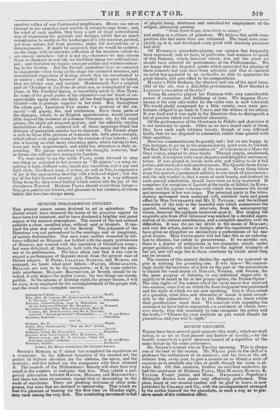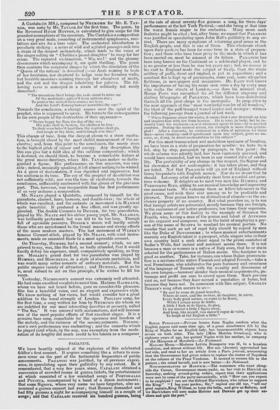BENEFIT CONCERTS.
THERE have been several good concerts this week ; which we shall notice, in so far as they present any feature of novelty,—for the benefit concerts in a great measure consist of a repetition of the same things by the same performers.
Mr. NEATE'S concert was on Tuesday morning. This is always one of the best of the season. Mr. NEATE joins to the skill of a professor the enthusiasm of an amateur; and his love of the art induces him, every year, to give a concert on so liberal a scale of expense as to preclude any idea of profit, though his room is al- ways full. On this occasion, besides an excellent orchestra, he had the assistance of Madame PASTA, Miss MASSON, RUBINI, E. TAYLOR, PARRY junior, and MORI. NEUKOMM'S .Napoleon's Midnight Review was again very effectively performed. This piece, many of our musical readers will be glad to know, is now published by CRAMER and Co., with the accompaniment arranged by the author himself for the pianoforte, in such a way as to pre- serve much of the orchestral effect. A Cantata (in MS.), composed by Nsuxostm for Mr. E. TAY- LOR, was sung by Mr. TAYLOR for the first time. The poem, by
the Reverend HUGH HUTTON, is calculated to give scope for the grandest conceptions of the musician. The Cantata is a.composition on a very great scale, consisting of instrumental symphonies, reci- tatives and airs for a bass voice. The orchestral introduction is peculiarly striking : a series of wild and agitated passages sink into a strain of the deepest melancholy; which leads to the voice of the singer calling on " Chaldea's proud daughter" to weep for her crime. The repeated exclamation, " Wo, wo ! 7 and the gloomy dissonances which accompany it,. are quite thrilling. • The poem then contains the scriptural images by which the desolation of the "Queen of the nations" is described ;—no Arab coming to taste of her fountains, nor shepherd to lodge near her forsaken walls, but horrible monsters roaming through her chambers of mirth, and the owl and the dragon inhabiting her palaces. The fol- lowing verse is conveyed in a strain of sublimity not easily described :
"The mountain-blast brings the rude shout to mine ear Of the multitudes gather'd from nations afar;
To punish the wicked their armies are here, And the Lord's flaming banner assembles the war!"
Towards the conclusion, a change comes over the spirit of the prophet, who is supposed to speak. He turns to the consequences to his own people of the destruction of their oppressor-
" Thrice happy for Zion the day of thy wo ;
His yoke shall be broken, his children be free: To their own belov'd land then thy captives shall go, And laugh at thy idols, and triumph o'er thee."
This change of tone, from the deepest gloom to a stern exulta- tion, is brought about by the most skilful management of the or- chestra; and, from this point to the conclusion, the music rises to the highest pitch of vigour and energy. Any description like this can give but a faint idea of this sublime composition ; which is destined, we should think, to become a remarkable feature at the great music-fneetings, where Mr. TAYLOR makes so distin- guished a figure. His performance, on this occasion, was very able ; indeed, Musically speaking, it left almost nothing to be wished. As a piece of declamation, it was dignified and impressive, but too uniform in its tone. The cry of the prophet of desolation was not sufficiently wild; nor was the tone of exultation, towards the conclusion, sufficiently contrasted with the gloom of the previous part. This, however, was inseparable from the first performance of so very arduous a composition.
Mr. NEATE played a Quintetto, composed by himself, for the
pianoforte, clarinet, horn, bassoon, and double-bass ; the whole of which was excellent, and the andante (a movement a la HAYDN) quite beautiful. It produced a fine effect, and was greatly ap- plauded. The double Concerto by DOSSER, for two pianofortes, played by Mr. NEATE and his clever young pupil, Mr. SALAMAN, was brilliantly performed, but was felt to be too long. Though full of agreeable passages, DUSSEK'S music will hardly satisfy those who are accustomed to the broad masses and strong effects of the more modern masters. The last movement of WEBER'S famous Concert-stuck, played by Mr. NEATE, with wind instru- ments, made an animated finale to a most agreeable concert.
On Thursday, HUMMEL had a second concert ; which, we are grieved to say, was, like the first, so badly attended, that it would hardly defray his expenses, small, comparatively speaking, as they are. MOZART'S grand duet for two pianofortes was played by HUMMEL and MOSCHELES, in a style of absolute perfection, and was worth many entire concerts of ordinary materials. But the public require variety of attraction ; and • HUMMEL, great as he is, must submit to act on this principle, if he wishes to fill his room.
Yesterday, NicHoLsoar's concert was extremely well attended. He had some excellent vocalists to assist him. Madame RAIMBAUX, whom we have not heard before, gave us considerable pleasure. She has a beautiful voice, and an elegant and expressive style. We know nothing of her views, but would consider her a great addition to the vocal strength of London. PHILLIPS sung, for the first time, a song written for him by NEunosisr (to whom we are indebted for our most interesting novelties at present), called "The Sea." It was encored with acclamations, and will become one of the most popular efforts of that excellent singer. It is a genuine bass song, remarkable for the openness and freedom of the melody, and the richness of the accompaniments. NICHOL- SON'S own performance was enchanting ; and the concerto which he played (and which, by the way, was exemplary from the mode- ration of its length) did much credit to his talents as a composer



























 Previous page
Previous page